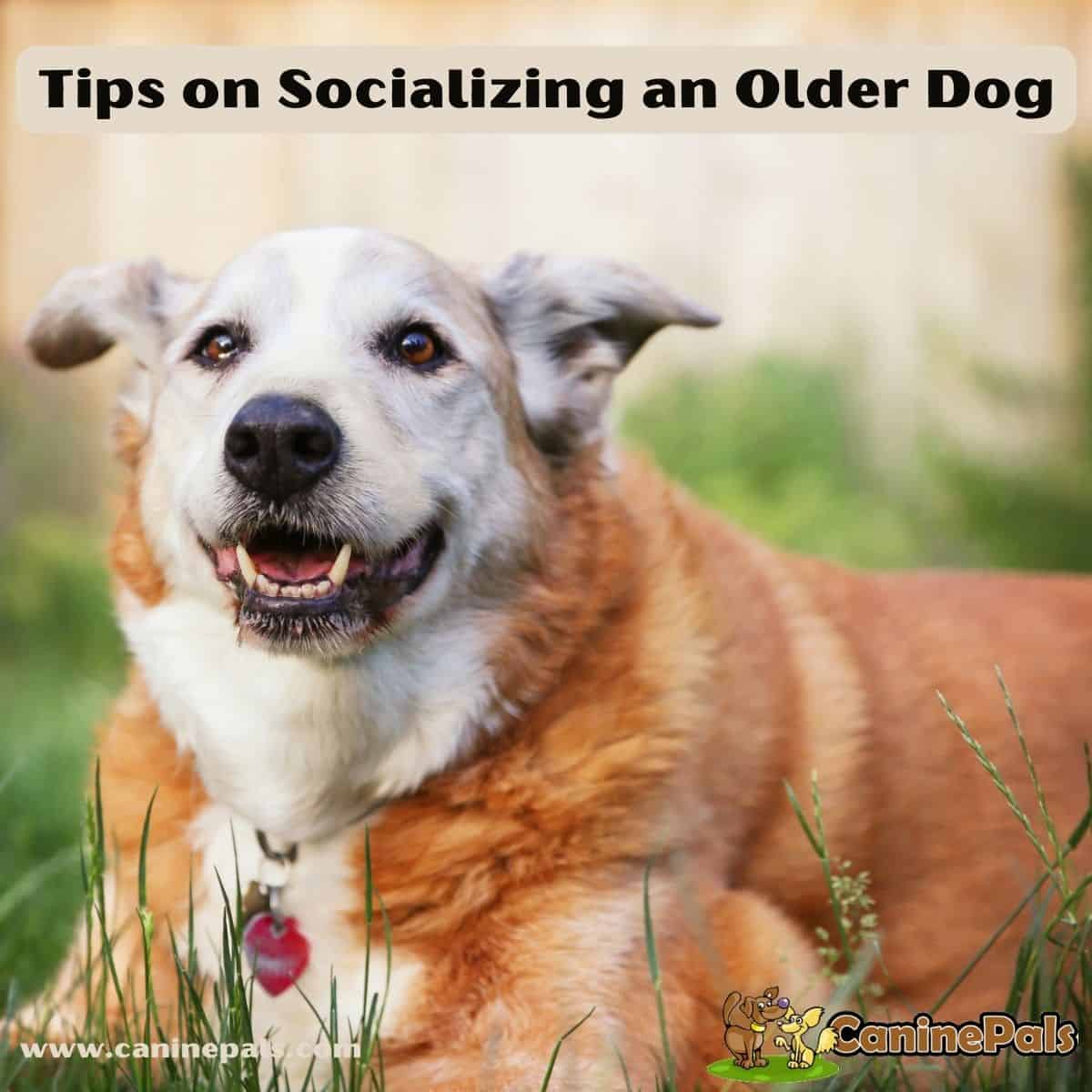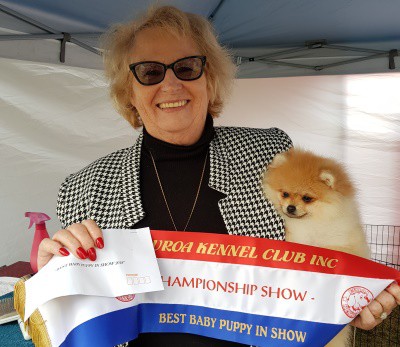Last Updated on March 20, 2024 by Denise Leo. Post first published on April 9, 2023.
Wild dogs grow up in dog packs and become socialized virtually when born. A dog interacts with others and learns body language and verbal cues. The pack has strong boundaries, and the puppies soon understand the strong leaders of the pack or they get discarded.
Domestic dogs start to socialize when they’re in the litter and after coming into contact with people. That early socialization period lasts four to 12 weeks, during which a dog has social skills permanently imprinted, and each interaction with people or dogs is a positive one.
Socialization generally continues on into a puppy’s adulthood. However, there are lots of new owners who adopt older dogs that didn’t become socialized in their early life.
When an owner brings home an adult dog, it’s essential to learn how much he has been socialized (or not). His early contact with you will be an indicator. Does he behave aggressively or is he fearful? Does he warn you with raised hackles or does he back off as you approach?
When you walk him, is he nervous around other sights and sounds? Is he shy when near other dogs and/or people? If you notice any of these signals, he probably wasn’t properly socialized. The good news is that you can do it for him.
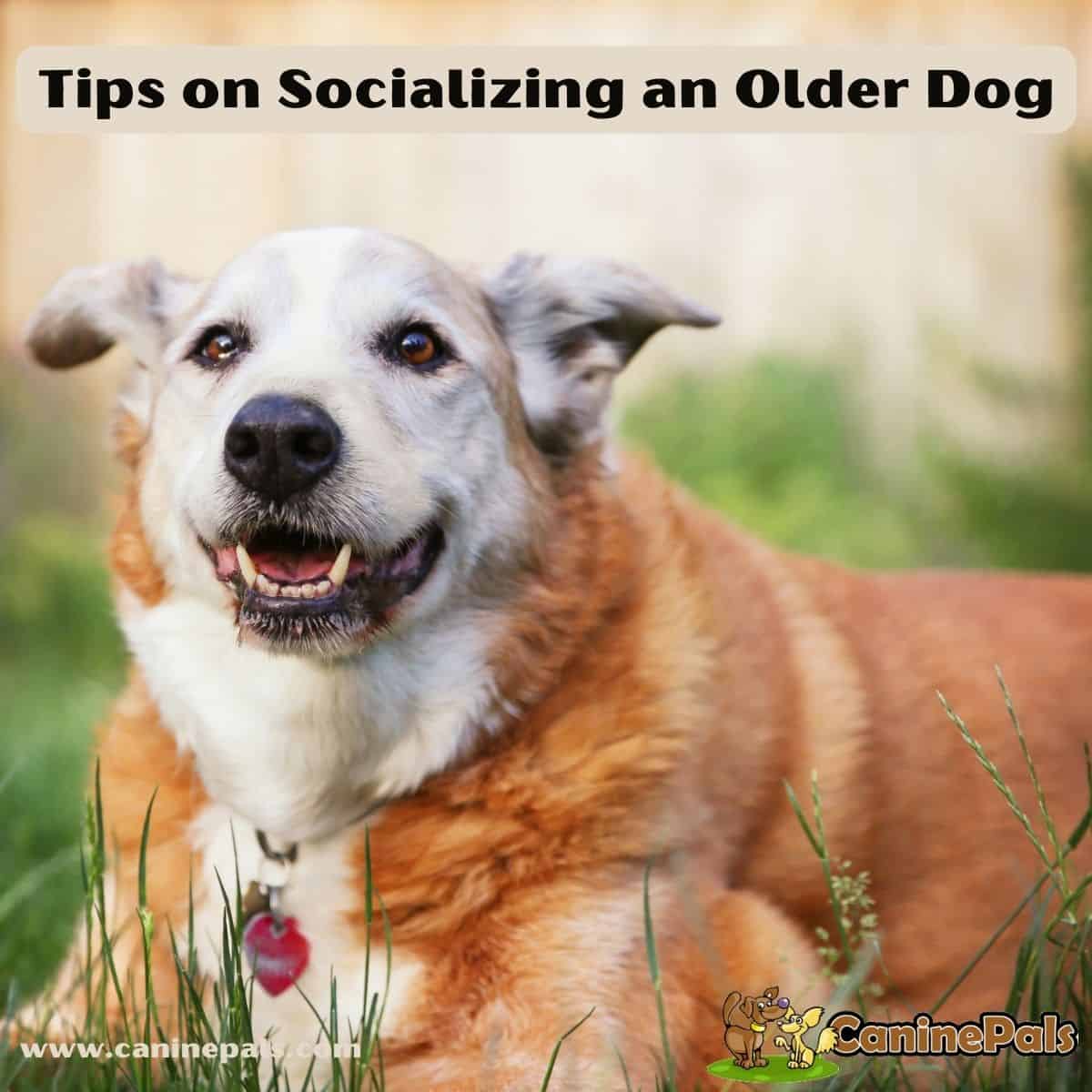
Do I need to Socialize My Senior Dog?
For some dogs, the opportunity to experience socialization only arrives once it’s too late.
Without proper exposure during their puppy days – between seven weeks and four months old – many woofs are left struggling with a lack of essential skills like communication or interacting well with others once they enter their new homes as adults.
Even if these lessons have been learned before, sustained repetition and continuation throughout everyday life is necessary for those same skills to be recovered forever due to isolation. Does their behavior indicate they need to brush up on their social skills?
Signs like fearfulness or aggression towards people and animals, cowering as you approach, nervousness when out for a walk, being shy around other dogs/people, and overly excited reactions are telltale clues that it’s time to start the process of socializing your adult pup.
Signs Your Senior Dog Requires Socialization Include:
- Does your adult dog seem uneasy when around people or other animals?
- Do they back away when strangers approach?
- Raise their hackles (hair on the back)?
- Get overly excited and cause anxiety in others?
These are all telltale signs that it’s time to start socializing! It may be intimidating at first, but with patience and dedication, you can create an enjoyable bonding experience for you and your fur child. Let’s explore how we can make this happen!
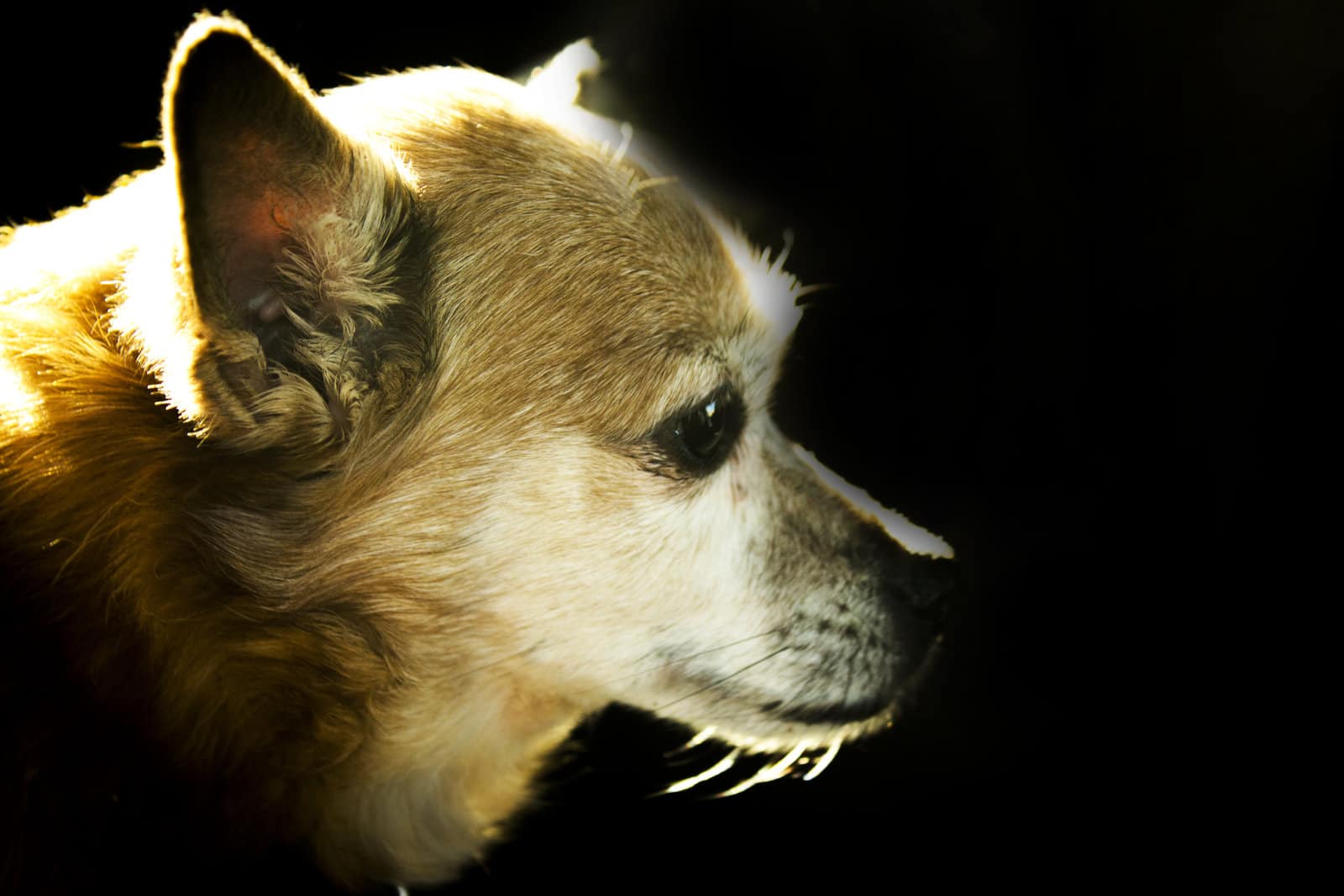
Benefits of Socializing Your Older Dog
Socializing your adult dog is one of the most valuable gifts you can give them. Doing so will make their life brighter, more comfortable, and more relaxed than ever!
There are many additional advantages to consider:
You’ll feel secure knowing they won’t run away due to stress at the sound or sight of strangers; adding a new dog (or pet) becomes easier with socialization. Even introducing children into the family down the line proves simpler if proper steps have been taken prior!
It pays off for furry friends and owners alike when dogs get along – remember this doggone important factor.

How To Socialize An Older Dog
Socializing an older dog doesn’t have to be a challenge! We have tips to give your pup new experiences and open up their world. With patience, love, and positive reinforcement – you can help them become more confident in social situations of all kinds!
Teaching an older pup the ropes of socialization requires patience and consistency – like a marathon, not a sprint. As you work through introductions to new people or environments, keep in mind that progress takes time; it’s best to go at the pooch’s own pace!
How to Socialize an Old Dog Top Tips:
Every Dog Needs Some Breathing Room!
Socialization for dogs is key, but letting strangers get too close can be frightening and overwhelming. Show your furry friend that you’ve got their back by gradually introducing them to new people at a pace where they feel comfortable. Take the time today – it’s never too late – and watch as little paw steps turn into confidence & joy in no time!
Take Your Senior Dog On Walks
New experiences can be beneficial for adult dogs. Frequent walks provide opportunities to become familiar with different sights, sounds, and smells and meet friendly humans and animals along the way!
To ensure a positive experience when encountering something new, redirect your pooch’s attention if they are barking or acting out. Changing direction will help them cool off so that you can continue your enjoyable walk.
Why not gather your closest companions and warmly welcome them in an environment tailored to suit your pup? Let the pooch take all the time they need for sniffing around, exploring, and deciding whether these guests can be trusted – if there’s no approach from their side, don’t hesitate to share some delectable treats as proof of friendly intentions. With everyone on board with staying calm, positive vibes will fill the atmosphere, ensuring happy moments for all!
Expose Your Senior Dog to New Experiences
Expand your pup’s horizons and give them an eye-opening experience by introducing something new. Find a friend to don the most fashionable hats or lure in a skateboarder for some slick tricks—whatever gets Fido interested!
Need help finding volunteers? That’s okay; open up their world from afar with safe perspectives, like watching other dogs playing at the park when you remain 100 feet away (but still close enough to get plenty of treats!).
Allow Your Dog To Set The Pace
Let curiosity be your dog’s guide! Help them safely explore the unknown by standing beside them and giving encouragement through treats. Allow your dog to take their time as they investigate, moving forward leisurely while keeping an eye on any signs of distress from getting too close.
Instead of bombarding your pup with multiple unfamiliar situations, focus on introducing them to just one new experience at a time. Keeping the number of unknowns minimal for your canine companion can help create an environment that’s less intimidating and more enjoyable.
Don’t push it if your canine companion seems agitated or scared.
Visit Dog Parks
Dogs love socializing, and a local dog park is a perfect place! However, your four-legged friend may be too anxious or old to dive into that excitement immediately.
Make their first introduction positive and stress-free by taking things slow – walk around the park’s perimeter and let them watch from afar until they feel more comfortable.
Gradually approach closer as you give treats when your pup reacts in a friendly way; however, move back again if showing any signs of aggression or nervousness. Don’t worry about having one bad experience either; with patience, frequent visits can turn even a scaredy cat pooch into an excited regular at doggie central!
Keep a Positive Outlook
Regarding managing your senior dog in tense or unfamiliar situations, attitude is everything. Your pooch mirrors how you feel, so remain composed and self-assured even when they seem anxious.
Avoid rewarding any scared behavior with cuddles as this will only encourage fearfulness – show your older dog there’s no need for alarm by staying calm!
So take charge – set an example for them by appearing unfazed no matter the situation. Lead on bravely, and they won’t have anything to worry about; after all – when we feel secure, so will they!
Dog Calming Aids
Give your pup some much-needed relief with calming aids! These specially designed products can drastically reduce stress and help keep Fido happy. Make sure to check in with the vet first, though—it’s always best to be safe regarding our furry friends’ health.
Obtain Professional Help
Are you struggling to train your pup? Consider seeking help from an experienced canine coach or taking them to a doggie daycare for some socialization and guidance.
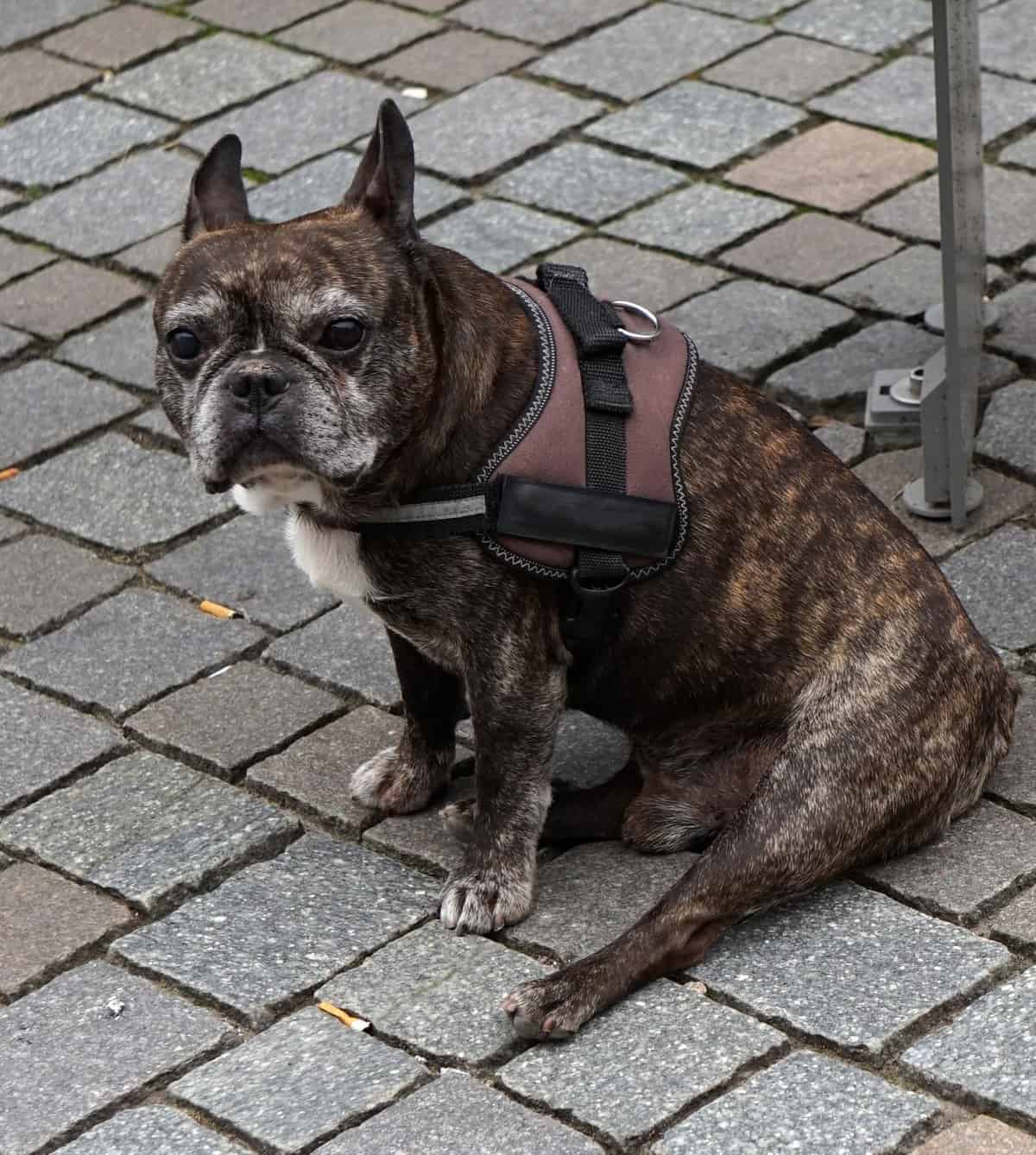
Older Dog
15 Tips for Socializing an Older Dog with Other Dogs
Take your dog out to observe.
• Visit a dog park but only sit or stand at the entrance. Don’t enter.
• Let him watch other dogs and see how they behave.
• Whenever a dog approaches you, give your dog a treat. This helps create a positive relationship with other canines.
• If your dog becomes aggressive when watching other dogs, move him away and slowly move back once he is calm.
Resist tugging while walking.
While you’re taking him for a walk, another dog may cross his field of vision, so try to resist yelling and don’t jerk his lead. This will only create a negative experience. Distract your dog with a toy or yummy treat. Command him to watch you and praise him lavishly when he does.
Attend obedience class.
Dog obedience class is a terrific method for socializing your adult dog even before you have play dates and/or park visits. He’ll learn new commands, and he’ll often be distracted. Talk to the trainer about the problem and she’ll assist you in making introductions to other dogs in that class in a slower manner. It’s also good because that’s a safe place to do it.
Socializing an adult dog with people.
Your family will be the first people to help your dog socialize. It must be done slowly and patiently. People and dogs speak different languages so you’ll be in the same boat.
Ignore your dog.
If he runs and hides, don’t chase and drag him out of his hiding place. Ignore him instead. Do something that will entice him to come out. Fry some bacon or play with his favorite toy. Dogs are naturally curious and social and you’ll find that he’ll quickly get bored from being alone and will come running. Give him a little bacon as a reward for coming out.
Act casually.
For example, if your teenager comes into the kitchen with a massive pimple on his nose, ignore it and pretend there’s nothing wrong. Act the same way with your dog; pretend his behavior isn’t a big deal and, that way, you’ll form a much calmer environment. Don’t make a fuss if he dashes through your legs to greet the postman at the front door.
Introduce your dog to new people SLOWLY.
Only introduce a single person to your dog per week. When they first meet your dog, ensure they have a pocket full of treats and give one to your dog while talking in a slow, happy, encouraging voice. Never use a high-pitched voice because that will only get him excited. Your dog needs to be on his leash and don’t make him go near the new person. Allow him time to do so.
The key to socializing any adult dog is that each experience should be positive and good, using treats and praise to help it work the way you want. This isn’t the right time or place for corrections, making him feel more nervous. Eventually, your new pet will finally relax and acknowledge his new home and outside environments, and he’ll finally be a treasured family member.
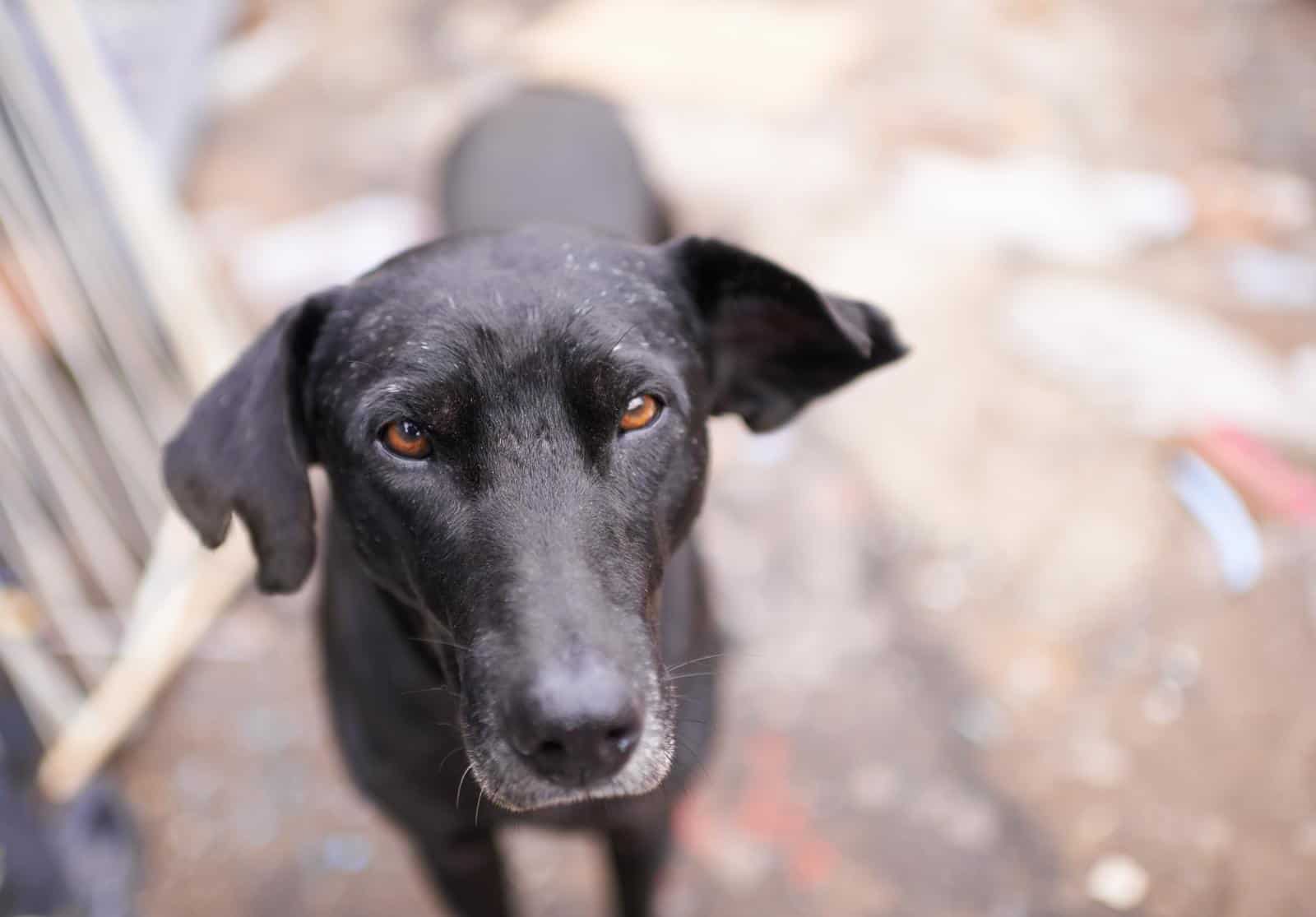
Socializing an Older Dog Conclusion
Socializing an older dog can be daunting, but the rewards for dog owners of having a happy and confident companion are well worth it! Through lots of repetition and consistency, provide your pup with calm and loving reassurance as they adjust to new situations.
By following the tips outlined in this post, like exposing him to different kinds of people and situations in a positive way, providing regular play, exercise, and training opportunities with reinforcement of correct behaviors, and using rewards-based methods to interact with your senior dog, you can nurture his social skills regardless of his age.
Establishing yourself as a trusted leader is also highly important. With patience and consistency, you’ll be able to help your older dog become more comfortable with human contact and get him out of his shell to find joy in social environments.
Most importantly — don’t forget to shower him with love! When given a chance and proper guidance, he may eventually surprise you with how quickly he adapts to new people and places.
Copyright Caninepals.Com. All Rights Reserved.

